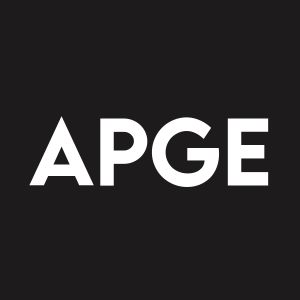Apogee Therapeutics Provides Business Update, Pipeline Progress and Reports First Quarter 2025 Financial Results
Rhea-AI Summary
Positive
- Strong cash position of $681.4M providing runway into Q1 2028
- 96% of current biologic patients would likely switch to APG777, showing strong market potential
- Positive interim Phase 1b results for APG808 showing 53% FeNO reduction in asthma patients
- Multiple pipeline advancements with APG777, APG279, and APG808 showing promising results
- 23% growth in total prescriptions and 44% growth in new-to-brand prescriptions in AD biologic market
Negative
- Increased net loss to $55.3M in Q1 2025 from $32.1M in Q1 2024
- Higher R&D expenses at $46.4M vs $28.7M year-over-year
- Increased G&A expenses to $16.7M from $9.5M year-over-year
- Cash position decreased from $731.1M to $681.4M quarter-over-quarter
News Market Reaction – APGE
On the day this news was published, APGE gained 6.14%, reflecting a notable positive market reaction.
Data tracked by StockTitan Argus on the day of publication.
Phase 2 APEX trial of APG777 in atopic dermatitis advancing with interim Part A 16-week data expected in mid-2025 and Part B actively enrolling
First patient dosed in Phase 1b trial of APG777 in mild-to-moderate asthma with readout expected in 1H 2026
APG279 on track to initiate Phase 1b head-to-head trial vs DUPIXENT in 2025 with readout expected in 2H 2026
Positive interim Phase 1b readout of APG808 in patients with mild-to-moderate asthma demonstrated rapid, robust and sustained suppression of FeNO, a biomarker of Type 2 inflammation that is associated with exacerbations in asthma
SAN FRANCISCO and WALTHAM, Mass., May 12, 2025 (GLOBE NEWSWIRE) -- Apogee Therapeutics, Inc., (Nasdaq: APGE), a clinical-stage biotechnology company advancing novel biologics with the potential for differentiated efficacy and dosing in the largest inflammatory and immunology (I&I) markets, including for the treatment of atopic dermatitis (AD), asthma, eosinophilic esophagitis (EoE), chronic obstructive pulmonary disease (COPD) and other I&I indications, today provided business updates, pipeline progress and reported first quarter 2025 financial results.
“2025 is poised to be a transformational year for Apogee, and we are pleased with the strong execution in the first quarter as we continue to advance therapies with the goal of reshaping the standard of care for patients living with I&I diseases,” said Michael Henderson, M.D., Chief Executive Officer of Apogee. “We have made significant progress in our Phase 2 APEX trial of APG777, which is actively enrolling Part B and on track for the interim 16-week readout from Part A mid-year. Momentum continues across our programs, driven by the initiation of our Phase 1b trial of APG777 in patients with mild-to-moderate asthma, today’s announcement of positive interim clinical trial results from our Phase 1b trial of APG808 in patients with mild-to-moderate asthma, as well as the positive Phase 1 interim readout for APG990, which exceeded all trial objectives and unlocked the potential for dosing APG279 (APG777 + APG990) two- to four- times per year with a single 2 mL co-formulated injection. Following these encouraging results from APG990, we are advancing our first-in-class combination strategy with plans to initiate a head-to-head Phase 1b study of APG279 versus DUPIXENT in AD later this year. With a very strong cash position and multiple catalysts across our portfolio in the months ahead, we are looking forward to an exciting and productive 2025 and 2026.”
New independent market research reinforces APG777's potential to become a market leader in the rapidly expanding AD biologic space:
Apogee conducted third-party quantitative market research in April 2025 and asked US patients and physicians the likelihood that they would switch to APG777 from their current or previous biologic assuming APG777 had similar efficacy and overall results to DUPIXENT and an every 3-month, or quarterly, injection maintenance schedule.
- Responses demonstrated that APG777 was highly preferred over current biologic options by patients and physicians
96% of patients currently on a biologic, both controlled and inadequately controlled, would likely switch to APG777.80% of physicians would likely start their biologic naive patients on APG777, while83% of physicians would likely switch inadequately controlled biologic patients to APG777.67% of physicians are open to switching their controlled patients to a quarterly dose of APG777.
- Compared to a hypothetical daily oral with equivalent efficacy and safety, patients and providers prefer APG777’s quarterly dosing profile:
- Patients prefer the APG777 profile by more than 3 to 1.
- Providers prefer the APG777 profile by nearly 4 to 1.
“Based on the recent market research we commissioned, APG777’s potential quarterly dosing is highly preferred by both physicians and patients to other available options. Physicians expressed strong interest in both initiating new-to-biologic patients to APG777 as well as switching patients already on biologics to APG777, assuming comparable efficacy and safety to current biologics,” said Jeff Hartness, Chief Commercial Officer of Apogee. “The AD biologic market is expanding rapidly—with year-to-date growth of
Pipeline Highlights and Upcoming Milestones
- Apogee continues to execute APG777 monotherapy program in AD and expansion indications: APG777 is a novel, subcutaneous (SQ), extended half-life monoclonal antibody (mAb) targeting IL-13 – a critical cytokine in inflammation and a primary driver of AD.
- The Phase 2 APEX clinical trial of APG777 is progressing, with Part A fully enrolled and Part B actively enrolling patients with moderate-to-severe AD. The company expects to report 16-week topline data from Part A of the trial in mid-2025 and from Part B in the second half of 2026.
- Apogee today announced that the first patient has been dosed in a Phase 1b trial of APG777 in patients with mild-to-moderate asthma. The primary endpoint of the trial is safety and tolerability, with secondary endpoints exploring pharmacokinetics (PK), FeNO suppression of APG777, with readout expected in the first half of 2026.
- The company also plans to initiate a Phase 2 trial in EoE in 2026.
- APG279 (APG777 + APG990) Phase 1b head-to-head study against DUPIXENT on track to initiate in 2025: APG990 is a novel, SQ, extended half-life mAb targeting OX40L, and the combination with APG777 offers the potential for improved clinical responses over monotherapy across a variety of I&I diseases while Apogee’s approach of co-formulating two extended half-life mAbs provides the potential for first-in-class and best-in-class dosing.
- In March 2025, Apogee reported positive APG990 Phase 1 interim results in healthy volunteers, unlocking potential maintenance dosing every three and six months for APG279 (APG777 + APG990)
- Apogee plans to initiate its first-in-class combination trial, a Phase 1b trial designed to evaluate the safety, PK, pharmacodynamics and efficacy of APG279 against DUPIXENT in patients with moderate-to-severe AD this year, with an interim readout expected in the second half of 2026.
- Progress continues in our combination approach of APG777 + APG333: APG333 is a novel, SQ, extended half-life mAb targeting thymic stromal lymphopoietin (TSLP), a key driver of Type 2 and Type 3 inflammation in eosinophilic and non-eosinophilic conditions.
- A Phase 1 trial of APG333 in healthy volunteers is underway, with data expected in the second half of 2025.
- Positive interim data for APG808 Phase 1b trial in asthma reported: APG808 is a novel, SQ extended half-life mAb targeting IL-4Rα, a target with clinical validation across eight Type 2 allergic diseases. In preclinical studies, APG808 has similar binding and femtomolar affinity for IL-4Rα as compared to DUPIXENT and has demonstrated similar inhibition to DUPIXENT.
- Today, the company reported positive interim results of the Phase 1b trial of APG808 in patients with mild-to-moderate asthma. The results demonstrated that APG808 was well-tolerated, with multiple doses of APG808 resulting in rapid suppression of FeNO, a biomarker of Type 2 inflammation that is associated with exacerbations in asthma, with a maximal robust FeNO decrease from baseline of
53% and sustained FeNO decrease from baseline of50% at 12 weeks. - APG808’s optimized PK profile coupled with FeNO suppression out to 12-weeks reinforce the potential for 2-months or longer maintenance dosing, offering a significant advantage compared to the current bi-weekly standard of care.
- Today, the company reported positive interim results of the Phase 1b trial of APG808 in patients with mild-to-moderate asthma. The results demonstrated that APG808 was well-tolerated, with multiple doses of APG808 resulting in rapid suppression of FeNO, a biomarker of Type 2 inflammation that is associated with exacerbations in asthma, with a maximal robust FeNO decrease from baseline of
First Quarter 2025 Financial Results
- Cash Position: Cash, cash equivalents and marketable securities were
$681.4 million as of March 31, 2025, compared to$731.1 million as of December 31, 2024. Based on current operating plans, Apogee expects its existing cash, cash equivalents and marketable securities will enable the company to fund its operating expenses into the first quarter of 2028. - R&D Expenses: Research and development (R&D) expenses were
$46.4 million for the quarter ended March 31, 2025, compared to$28.7 million for the quarter ended March 31, 2024. R&D expenses increased primarily due to the advancement of the pipeline and continued development of the company’s programs, and increases in personnel-related expenses and equity-based compensation, associated with the growth in the company's R&D team. - G&A Expenses: General and administrative (G&A) expenses were
$16.7 million for the quarter ended March 31, 2025, compared to$9.5 million for the quarter ended March 31, 2024. G&A expenses increased primarily due to increases in personnel-related expenses and equity-based compensation, primarily driven by increased headcount and an increase in the fair value of equity awards granted. These increases are the result of the company’s expansion of operations to support the growth in its business. - Net Loss: Net loss was
$55.3 million for the quarter ended March 31, 2025, compared to a net loss of$32.1 million for the quarter ended March 31, 2024. Net loss increased primarily as a result of higher R&D and G&A expenses as described above, partially offset by higher interest income.
About Apogee
Apogee Therapeutics is a clinical-stage biotechnology company advancing novel biologics with potential for differentiated efficacy and dosing in the largest I&I markets, including for the treatment of AD, asthma, EoE, COPD and other I&I indications. Apogee’s antibody programs are designed to overcome limitations of existing therapies by targeting well-established mechanisms of action and incorporating advanced antibody engineering to optimize half-life and other properties. APG777, the company’s most advanced program, is being initially developed for the treatment of AD, which is the largest and one of the least penetrated I&I markets. With four validated targets in its portfolio, Apogee is seeking to achieve best-in-class efficacy and dosing through monotherapies and combinations of its novel antibodies. Based on a broad pipeline and depth of expertise, the company believes it can deliver value and meaningful benefit to patients underserved by today’s standard of care. For more information, please visit https://apogeetherapeutics.com.
Forward Looking Statements
Certain statements in this press release may constitute “forward-looking statements” within the meaning of the federal securities laws, including, but not limited to, statements regarding: Apogee’s plans for its current and future product candidates and programs; the anticipated timing of the initiation of its clinical trials, including the Phase 1b trial of APG279 (the combination of APG777 and APG990) in AD, the Phase 2 trial of APG777 in EoE, and the Phase 1 trial of APG333 in healthy volunteers; the expected timing of and results from its clinical trials, including data from Part A and Part B of its Phase 2 trial of APG777 in AD, Phase 1b trial of APG279 in AD, Phase 1 trial of APG333 in healthy volunteers, Phase 1b trial of APG777 in asthma; its planned clinical trial designs; its plans for current and future clinical trials; the potential clinical benefit and half-life, PK profile and dosing regimen, and treatment outcomes of APG777, APG279, APG990, APG333, APG808, Apogee’s other product candidates, including combination therapies, and any other potential programs; its planned business strategies; its expected timing for future pipeline updates; and its expectations regarding the time period over which Apogee’s capital resources will be sufficient to funds its anticipated operations. Words such as “may,” “might,” “will,” “objective,” “intend,” “should,” “could,” “can,” “would,” “expect,” “believe,” “design,” “estimate,” “predict,” “potential,” “develop,” “plan” or the negative of these terms, and similar expressions, or statements regarding intent, belief, or current expectations, are forward-looking statements. While Apogee believes these forward-looking statements are reasonable, undue reliance should not be placed on any such forward-looking statements, which are based on information available to the company on the date of this release. These forward-looking statements are based upon current estimates and assumptions and are subject to various risks and uncertainties (including, without limitation, those set forth in Apogee’s filings with the U.S. Securities and Exchange Commission (the SEC)), many of which are beyond the company’s control and subject to change. Actual results could be materially different. Risks and uncertainties include: global macroeconomic conditions and related volatility, expectations regarding the initiation, progress, and expected results of Apogee’s preclinical studies, clinical trials and research and development programs; expectations regarding the timing, completion and outcome of Apogee’s clinical trials; the unpredictable relationship between preclinical study results and clinical study results; the timing or likelihood of regulatory filings and approvals; liquidity and capital resources; and other risks and uncertainties identified in Apogee’s Annual Report on 10-K for the year ended December 31, 2024, filed with the SEC on March 3, 2025, and subsequent disclosure documents Apogee may file with the SEC. Apogee claims the protection of the Safe Harbor contained in the Private Securities Litigation Reform Act of 1995 for forward-looking statements. Apogee expressly disclaims any obligation to update or alter any statements whether as a result of new information, future events or otherwise, except as required by law.
| APOGEE THERAPEUTICS, INC. CONDENSED CONSOLIDATED BALANCE SHEETS (UNAUDITED) (In thousands, except share data) | ||||||||
| MARCH 31, 2025 | DECEMBER 31, 2024 | |||||||
| Assets | ||||||||
| Current assets: | ||||||||
| Cash and cash equivalents | $ | 106,916 | $ | 141,789 | ||||
| Marketable securities | 406,413 | 378,864 | ||||||
| Prepaid expenses and other current assets | 8,202 | 9,060 | ||||||
| Total current assets | 521,531 | 529,713 | ||||||
| Long-term marketable securities | 168,106 | 210,416 | ||||||
| Property and equipment, net | 5,679 | 1,959 | ||||||
| Right-of-use asset, net | 11,507 | 11,365 | ||||||
| Other non-current assets | 7,339 | 498 | ||||||
| Total assets | $ | 714,162 | $ | 753,951 | ||||
| Liabilities and stockholders' equity | ||||||||
| Current liabilities: | ||||||||
| Accounts payable | $ | 2,445 | $ | 1,071 | ||||
| Lease liability | 3,976 | 3,234 | ||||||
| Accrued expenses and other current liabilities | 26,539 | 24,255 | ||||||
| Total current liabilities | 32,960 | 28,560 | ||||||
| Long-term liabilities: | ||||||||
| Lease liability, net of current | 7,840 | 8,597 | ||||||
| Total liabilities | 40,800 | 37,157 | ||||||
| Stockholders' equity: | ||||||||
| Common Stock; | 1 | 1 | ||||||
| Additional paid-in capital | 1,033,542 | 1,021,794 | ||||||
| Accumulated other comprehensive income | 1,074 | 915 | ||||||
| Accumulated deficit | (361,255 | ) | (305,916 | ) | ||||
| Total stockholders’ equity | 673,362 | 716,794 | ||||||
| Total liabilities and stockholders’ equity | $ | 714,162 | $ | 753,951 | ||||
| APOGEE THERAPEUTICS, INC. CONDENSED CONSOLIDATED STATEMENTS OF OPERATIONS (UNAUDITED) (In thousands) | |||||||||
| THREE MONTHS ENDED MARCH 31, | |||||||||
| 2025 | 2024 | ||||||||
| Operating expenses: | |||||||||
| Research and development | $ | 46,387 | $ | 28,716 | |||||
| General and administrative | 16,709 | 9,465 | |||||||
| Total operating expenses | 63,096 | 38,181 | |||||||
| Loss from operations | (63,096 | ) | (38,181 | ) | |||||
| Other income, net: | |||||||||
| Interest income, net | 7,840 | 6,087 | |||||||
| Total other income, net | 7,840 | 6,087 | |||||||
| Net loss before taxes | (55,256 | ) | (32,094 | ) | |||||
| Provision for income taxes | (83 | ) | — | ||||||
| Net loss after taxes | $ | (55,339 | ) | $ | (32,094 | ) | |||
Investor Contact:
Noel Kurdi
VP, Investor Relations
Apogee Therapeutics, Inc.
Noel.Kurdi@apogeetherapeutics.com
Media Contact:
Dan Budwick
1AB Media
dan@1abmedia.com








